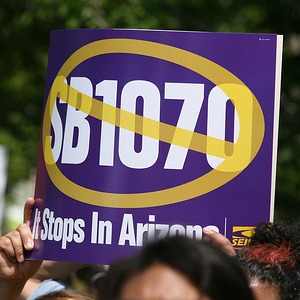Leveraging Arizona’s Immigration Law Into Citizens And Votes
 by Griselda Nevárez, Voxxi
by Griselda Nevárez, Voxxi
Despite the outcry of hundreds, celebrity supporters and loud but peaceful protests that were staged demanding a veto, Brewer signed the bill into law ten days later, causing an uproar among the state’s Hispanics, immigrants and their advocates.
Not long after, Latinos in Arizona mobilized to mend the damage they perceived had been set in motion and worked tirelessly trying to change the anti-immigrant, anti-Hispanic and polarizing sentiment that swept the Grand Canyon state following Brewer’s signature.
With two strokes of her pen, Brewer not only signed SB1070 into law, she also used her signature to ban on ethnic studies shortly thereafter.
That summer, a time when desert temperatures climb into triple digits, dozens of Latino organizations summoned hundreds of volunteers to take on the scorching sun and canvass neighborhoods to register Latinos to vote. They collectively registered more than 30,000 Latino voters.
Of those, 13,000 were registered by Promise Arizona in Action, a group that organized 1,000 volunteers to canvass Latino neighborhoods.
“People were really angry, and they wanted to do something about it,” said Petra Falcón, who heads Promise Arizona in Action.
Last November, Falcón’s group also registered hundreds more voters. Many of them went to the polls for the first time that month and were a driving force behind the recall of Sen. Russell Pearce, the architect of SB 1070.
The US Supreme Court is set to review the legality of Pearce’s creation on April 25, the same time many Hispanic organizations will again hit the streets and register more voters, said Falón.
“Latinos and immigrants in Arizona are fighting back by empowering themselves at the ballot box,” she said. “Yes we march, but now we are marching to our voting booths.”
The voter-registration efforts are part of a national campaign that is encouraging the 8.1 million eligible immigrants to apply for citizenship before the end of April if they want to vote in the November election.
They also want immigrants to be able to elect candidates who will not push for punitive bills like SB 1070. The law allows police officers to check the immigration status of those they suspect to be in the country illegally had U.S. District Judge Susan Bolton not blocked that and three other key provisions July 28.
The citizenship campaign is composed of groups such as Falcón’s Promise Arizona in Action, the National Immigration Forum, the National Council of La Raza and the Asian Pacific American Legal Center.
Of the 8.1 million people eligible for naturalization, 4 million are Latinos and 2.9 million are Asian Americans and Pacific Islanders,
In Arizona, 170,000 people, or 3.9 percent of the state’s voting-eligible population, are eligible to apply for citizenship.
Diana Díaz, a 30-year-old who emigrated from Colombia nearly 13 years ago, is one of the immigrants in Florida who is eligible. Díaz said she began the process of applying for citizenship last year when the Florida Legislature debated passing an SB 1070 copycat. The bill never became law.
It was then that she “realized that it was time to engage in American politics. As the debate over immigration continues to turn angry, I want to make sure my voice is heard instead of standing on the sidelines as others decide on my life and the future of my family.”
Clarissa Martínez, from the National Council of La Raza, said Díaz is an example of those who have been motivated by SB 1070 and other laws like it to start the process of naturalization and become active in the political process.
Martínez pointed out that the anti-immigrant sentiment created by SB 1070 didn’t just stay in Arizona. It proliferated across the country, and at least 30 states have introduced similar immigration laws, she said.
Alabama, Georgia, South Carolina, Utah and Indiana have all passed their own versions of SB 1070 and have had key provision blocked in court.
Now more than ever, as the fate of SB 1070 and its copycats rests on the Supreme Court, Martínez said eligible immigrants should follow Díaz’s footsteps and use their political power to change the country’s climate on immigration.
Griselda Nevárez is a reporter with Hispanic Link News Service in Washington D.C.
[Photo by Nevele Otseog]
